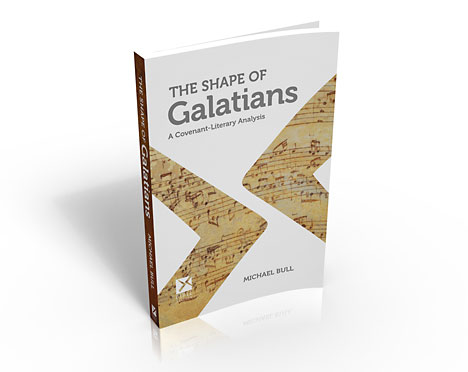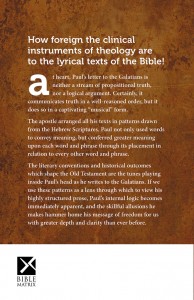Shape of Galatians Review
The book is currently with the editor for a polish and will be available soon. Here’s a unique review from Steven Opp, who is actually quoted in the book, but don’t let his bias deter you. I still reckon the literary “riffs” are the Apostle Paul’s, not mine, so imagine it’s Paul up there on stage with a “drumitar” and a heart full of jazz.
Several years ago I went with my brother Ryan to see Béla Fleck and the Flecktones in concert. They are an instrumental fusion band consisting of a banjo, sax, bass, and “drumitar” (if you donʼt know what a drumitar is, go on youtube and find out!) As we waited for the curtains to open, I asked Ryan if he knew what songs theyʼd be playing. He said they would do some of their hits but that it would probably morph into a jam session. But not just any jam session. We would witness some of the worldʼs best jazz and bluegrass artists come together and just have some fun. “The truth is,” he said,“weʼre basically going to watch four really talented guys get on stage and play with their toys for a couple hours.” As the night unfolded, I realized he was right. And it was a great concert!
Reading a book by Michael Bull is like watching a Flecktones jam session. He gets up there with some funny looking instruments, opens his Bible, and starts making sounds. Before you know it you start nodding your head to the beat as he plays a tune you know youʼve heard before but never quite like this.
This time the song is Galatians. But before Bull starts jamming, he gives the audience a chance to look over his “toys” which he will be playing with. They are these funky boomerang-shaped gadgets he calls Covenant-Literary Templates. Somehow they appear similar yet different at the same time. But they all look a bit familiar, though you swear youʼve never seen one before. Before you can look too long, he opens up Galatians, grabs an instrument and begins to play.
As you listen to the familiar intro, you comfortably hum along. But then he takes it places you hadnʼt counted on and begin to wonder if he forgot to tune before the show. He plays a note that sounds like it came out of nowhere. The note is Achan. Yes, Achan, the guy who took a little off the top from the Jericho haul–how did he make it into the Galatians song? Then Bull gets back into the tune youʼre familiar with. “Oh well.” You think. “Maybe Iʼm the only one who noticed the flat note. Even the greatest musicians make mistakes now and then. Maybe heʼll retune at intermission.” But just as you have moved from giving him the benefit of the doubt, he does it again. This time with King Ahazʼs prophets. Another bad note. “Weʼre talking about Paul and the Judaizers, whereʼd these Baal worshipers come from?” As you ponder this, he does it again. And again. Now you begin to wonder if heʼs even playing the right song. The program says “Galatians,” but you keep finding yourself in the backwoods of your Bible, a long way from Jesus and Paul and the early Church. Who is this guy? What is this exotic stuff heʼs playing? No wonder people used to think jazz was the devilʼs music!
So you decide to ask him at intermission why he was destroying one of your favorite songs with these strange chords. “You have a very, um, interesting style. But I gotta ask you, why did you play that Esau chord in Chapter 2? I have the sheet music for Galatians at home and I donʼt see that anywhere on there.”
He answers: “Because I felt like it.”
You are aghast! “Because you felt like it? What kind of exegesis is that?”
He replies, “I knew the song of the Bible. Figured it didnʼt matter what octave I played it in, so long as I play the right note. Esau seemed to fit there. Howʼd it sound?”
You werenʼt ready for this. You think for a second…“It sounded okay, I guess, I just wasnʼt expecting that particular…”
“Keep listening,” he assures you. “See if it doesnʼt start to sound familiar. And try to relax.” He gets back on stage, picks up a new instrument and continues to jam.
As you listen again you decide to put your expectations of what Galatians is aside and just take his version for what it is. You decide to enjoy the melodies about the patriarchs and the law and Ezekiel at face value. You fold your program, which for whatever reason still says “Galatians” on it, and put it in your pocket. You allow yourself to sway to the music. Youʼre out on a Friday night and you are committed to having a good time.
Under this new resolve, the music begins to take you to a thousand places with as many ideas and insights, some of them familiar, some foreign. He plays a little ditty about Passover. Not what you bargained for but whatever, it sounds nice. Later he does a short solo… something about Lamech. Didnʼt see that coming, but the more you think about it, the more it seems to fit.
As the concert continues, it starts to sound more and more familiar. You realize that while this wasnʼt what you were expecting, he really was playing your cherished Galatians all along. That jam session was kinda fun, you decide. After the show you buy the CD. You listen to it several times. You realize you kind of like this version, not only of the song, but of this music making style itself. You donʼt mind the apparent diversions from the text into dustier parts of the Bible. While itʼs not the octaves youʼre used to, it really is all the right notes. It works. Then you begin to discover youʼve got a little jazz in your own hermeneutical soul. You start reading your Bible a little differently. You start to experiment. You pick up some of Bullʼs instruments and goof around with them. You have some fun…
Over time you realize that youʼve started to get pretty good at synthesizing beats from various angles. One day you remember something Bull said about the internalizing of the law, something about maturity, something about glory. You wonder if somehow youʼve moved that direction as youʼve become more jazzy of a Bible reader. But you donʼt think about that too long because you just thought of a new melody you want to try out.
You pick up a toy and start playing.
Back cover: Click for a larger image.



























